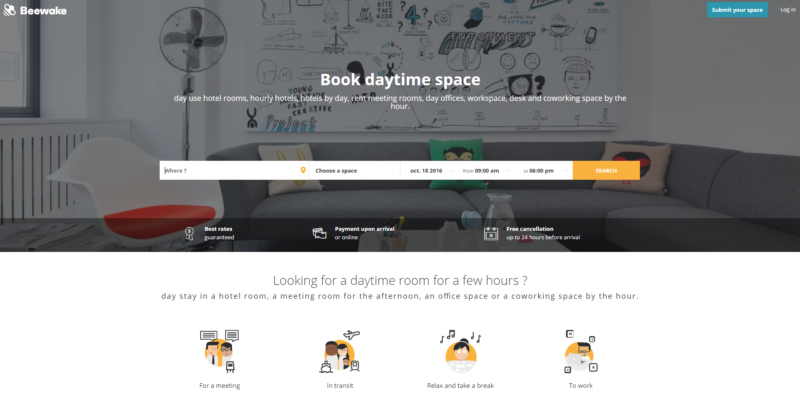Gap in the Market Volume 8 - Corporate Travel

As part of our Gap in the Market series, every so often we take a closer look at a particular travel industry niche. The general idea is that we provide ambitious business minds with the information, inspiration, and motivation to consider setting up a marketplace in that space. This week we're delving into the world of corporate travel. Let's get started.
So for those of you that are new to the concept, what is corporate travel, and what kind of services does it entail?
Corporate travel refers to travel for business purposes. In an increasingly connected and globalized world, companies are doing business across borders more than ever. And although Skype is great, often partnerships require international trips for meetings, conferences and the like. That's where corporate travel agencies come in handy. They handle bookings for corporate travellers, transfers, flights and accommodation, along with anything else that might be needed for a successful business trip.
Increasingly it's less about simply arranging travel and more about service in the corporate travel sector. Business travellers require ever more personalised bookings, from specific transport requests to workspace allocation and networking opportunities. The ability to meet these growing needs are what separate corporate travel agencies from the norm. We'll touch on some of these later.
Corporate is one travel sector where loyalty still exists
It's no secret that loyalty in the travel industry is a rare thing these days. With huge competition online, travelers booking trips for leisure and tourists around the world have a host of options to choose from. This means that loyalty, though hardly a thing of the past, is certainly on the wane. Customers will go first and foremost to where the price is right. But that's not necessarily the case in the world of corporate travel. Businesses want to work with agencies that meet their needs and provide an excellent, reliable service. Tick those boxes and your very own corporate travel startup could be on to a winner, with loyal businesses that value consistency.
Corporate travel is more complex than you might think
When we break it down, corporate travel is a little more complex than its sister sectors in the industry. Think about the relationship between buyer and seller. The dynamic is different than with most travel transactions. First of all, the person making the booking is unlikely to be the person actually doing the travelling. Therefore corporate travel agencies are more likely to deal directly with admin staff representing companies, who are themselves acting as an intermediary for the travellers. So many corporate travel marketplaces will actually find themselves, despite already being essentially middlemen, dealing with others who are essentially middlemen as well. This is an interesting dynamic.
Especially when you consider that for the travel agency to deliver the perfect service, they're going to need detailed information on the personal requirements of those travelling - a lot more than simply the date and standard of accommodation required. Of course, the end result is going to be the same. If the end user is happy, the customer is happy. But there's no doubting the increased importance of effective communication for corporate travel bookings.
So what defines the happiness of corporate travellers? Well, according to research carried out by the Global Business Travel Association (GBTA), there are four key areas that impact upon business travel satisfaction. These are “booking”, “productivity during travel”, “tracking and reporting” and “personal life”.
Now, booking and productivity during travel both play a role in forecasting whether or not a corporate traveller is going to get back home satisfied with how things went. The same goes for "tracking and reporting" and "personal life", but there is a slight generation split on just how important these final two factors are. Older travellers with families, for example, are more likely to care about having strong communication links while away on business. In any case, we can focus on the primary two drivers of business travel satisfaction: booking and productivity on the go. Booking is an easy one for agencies to get right. As long as the process is swift, efficient and self-explanatory, everyone's a winner.
Productivity on the go, however, is more difficult for agencies to guarantee. They in turn will need to work with partners to ensure that all transport services and accommodation available are suitable for remote working, which may be easier said than done.
What does the future hold for corporate travellers?
While expenditure on corporate travel is growing globally, it's difficult to say how it will go hand in hand with the also-rising trend of remote work. The sharing economy, the democratisation of space and more and more choosing self-employment may mean that corporate travel is going to continue to grow, but perhaps not as we know it in its current form. There's no reason why business travel won't also be disrupted by these emerging trends in the world of work and technology.
One great example in this exciting, developing space is Beewake, a corporate travel startup turning conventional business travel on its head. Instead of just sorting you out with a room for the night (not that there's anything wrong with doing just that, of course) Beewake brings corporate travellers and vacant day spaces together. Through Beewake you can hire out office space, a meeting room or a hotel room as part of an on-demand service, whether you need somewhere to work, recuperate or get together with clients.
Sure, it's a simple idea, but there's no doubt that it's tapping into where the demand is in the world of business travel. Corporate travellers want flexibility just as much as your average tourist.
Anyway, we got in touch with the team at Beewake to talk some more about their concept, the corporate travel market, and life as a young startup in the industry. Here are the highlights.

Every travel startup begins as an idea, as a moment of inspiration. And for Beewake co-founder Jeremie Catez, things were no different.
Having worked in the hospitality industry for a decade, Jeremie had seen firsthand how the sharing economy and online travel sites were cutting into profits on the traditional hotel scene. He told me, "Hotels were doing a fantastic job of selling overnight stays. However, they never really sold daytime spaces, such as sleeping rooms or meeting rooms, despite the growing demand for daytime spaces from both business and leisure customers."
And so Beewake was born. But despite the obvious appeal of the concept to both customers and hoteliers looking to utilise empty space, it hasn't always been plain sailing. Jeremie described two challenges that they quickly ran into after setting up. The first was that "The hotels are professionals of space management, and while they are very organised, they are also very fragmented in the sense that there are hundred of hotels brands and even more non-branded properties, which means dealing with thousands of legacy systems (PMS, CRS and channel managers)."
On top of that, disrupting the most traditional of markets comes with its unique challenges. "The hotel industry has always focused on overnight business, and therefore we are facing some challenges in educating hoteliers about the daytime business opportunity," says Jeremie. "At Beewake we are targeting the business travellers, but [in the eyes of hotelliers] daytime use is frequently associated with romance".
Hurdles that need to be overcome are a standard part of any travel startup's successful journey. Vital in finding the solutions and breaking through challenges are founders and staff working towards a shared vision with a genuine passion for the product on offer.
Jeremie Catez agrees: "I do believe that in any corporation, but even more importantly in a startup, the team is the key to success, the same as in a relationship. Good teamwork is essential in all organisations. It signifies that people are working towards a shared purpose and common goals and in so doing they are sharing their varied skills in complementary roles and in cooperation with each other."
But while Beewake is clearly the result of a team with a passion for travel, the focus is very much on perfecting the product and making it as appealing as possible to corporate travellers. "From the beginning," says Jeremie, "we have decided to invest time and energy in the product, since we believe that the product has to be perfect if we want people to use it. Our product is the most important aspect in our marketing, as without it there is nothing to be promoted, strategically placed and priced.
Beewake appears to be riding the wave of remote work at the perfect time. "We've definitely seen the evolution of the workplace in the last decade, and thanks to new technologies it’s now easier for people to work from everywhere," says Jeremie. "Mobility and the cloud have changed the way that we work. Specifically, when and where we work. Now that cloud technology has made data and applications more accessible, productivity is not confined to the four walls of an office anymore."
He explains that a recent survey of business leaders at the Global Leadership Summit in London found that 34% said more than half their company’s full-time workforce would be working remotely by 2020. A full 25% said more than three-quarters would not work in a traditional office by 2020. "This is not some far off, futuristic era," points out Jeremie. "It’s four years from now."
Beewake certainly seems to be on an upward trajectory, particularly given the growing demand for daytime spaces in the world of business, never mind the huge amount of potential space available in the world's major cities. If you want to find out more about Beewake, you can download the app on Android or iOS, or visit the website: www.Beewake.com
Interested in setting up your own corporate travel marketplace? We can help with that.
So there's our dive into the world of corporate travel. There's no doubt that the way we work is changing, but as of yet it's difficult to say how that will affect the industry that's grown around business trips. Does more remote work mean a higher demand for daytime working spaces out of the office? Quite possibly. Does a more connected world mean that companies will have greater justification for sending employees abroad? Almost certainly.
In case you didn't already know, our proprietary marketplace software is a powerful solution for any startup in the travel industry looking to bring buyers and sellers together. Our solution helps you aggregate sellers and build a popular, SEO-friendly travel marketplace, while a range of content marketing features help you shout just as loud as the big online players in the industry.
Contact us today to find out more.